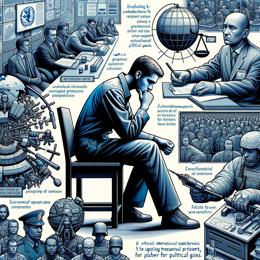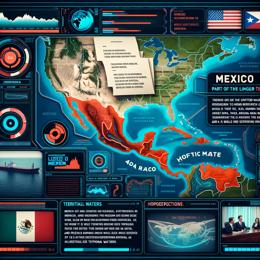Image created by AI
Ukraine Firmly Rejects Pope's White Flag Commentary Amidst War with Russia
Amidst the ravaging conflict between Ukraine and Russia, comments made by Pope Francis suggesting Ukraine to show "courage to raise the white flag" have sparked significant outrage. The Pope's interview with a Swiss broadcaster RTS has been met with vehement disapproval and categorial rejection by Ukrainian officials who stress that negotiations with Russia equate neither to surrender nor equanimity. Foreign Minister Dmytro Kuleba turned to social media to reaffirm Ukraine's steadfast dedication to their national flag and to refute any notion of capitulating to Russia's aggression.
Pope Francis, amidst his call for negotiations, touched on a historical nerve by suggesting Ukraine raise a white flag—a symbol synonymous with surrender—sending ripples across the Ukrainian populace and its representatives. Kuleba's response was poignant and multi-dimensional. Not only did he earnestly call on the Pope to side with what Ukraine perceives as 'the good' in this conflict, but he also invoked historical instances where Vatican strategies seemed to lean towards unbefitting conciliation, referencing events during World War II. Kuleba's message was clear: the path forward is not in negotiating from a position of weakness but in unified, unwavering resistance to aggression.
The Ukrainian Foreign Minister also extended an invitation to Pope Francis, emphasizing a desire for the Pontiff's visit to Ukraine as a gesture of support to the millions of Catholics and all Ukrainians enduring the brunt of war. He maintained a balanced approach in his communication, showing appreciation for the Pope's prayers for peace while subtly critiquing the stance on negotiations.
Pope Francis's sentiments on this matter stand in contrast with the voices of Ukraine and its allies. Polish Foreign Minister Radoślaw Sikorski responded by suggesting that the Pope's energies would be better directed towards urging Putin to withdraw his troops, thereby achieving peace without debating the logistics of a forced negotiation. Sikorski's sentiment was further fortified by the comments of Andrii Yurash, Ukraine's ambassador to the Holy See, who likened engaging with Russia at this juncture to ‘talking with Hitler,’ disapproving of any form of surrender in concord with the Archbishop of the Ukrainian Greek Catholic Church.
In an attempt to quell the backlash, Vatican spokesman Matteo Bruni elucidated that the Pope's comments were intended to support a negotiated truce rather than an outright surrender. This clarification, though, does little to address the underlying concern that Pope Francis’s remarks seem inadequately sensitive to the complexities of Ukraine's geopolitical predicament.
President Volodymyr Zelenskyy’s administration has remained adamantly against direct engagement with Russia, articulating that Ukraine, as the invaded country, stands its ground and that any talks of peace should originate from this fundamental acknowledgement.
Pope Francis's commentary, stretching the limits of the Vatican's historical neutrality, highlights a sensitive and polarizing issue—one where the stakes are life, sovereignty, and national integrity for the Ukrainian people.










